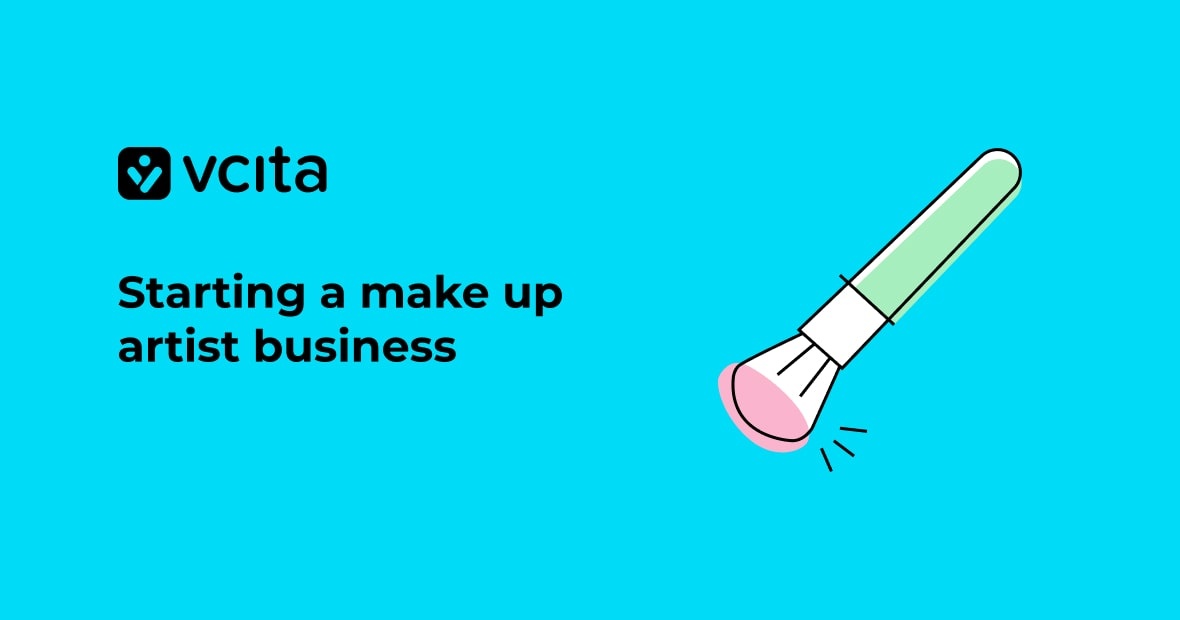If you’ve always had a passion for makeup, you might be ready to take the plunge and start a makeup artist business. Making that decision is half the battle, but now where do you begin?
In this article, we’ll cover everything that’s involved in setting up your own makeup business, from the necessary kit and attracting your first customers to developing your skills and growing your business. Read on to learn what you need to do to get your makeup business off the ground.
Laying the groundwork: the vital steps for starting your makeup artist business
To start a makeup artist business, you need to make it official by registering your business. This establishes your company as a legal entity and allows you to legally operate. You’ll need to choose a business structure, like a sole proprietorship, partnership or corporation. Then, register your business with your state.
Build your portfolio and online presence
As a makeup artist, your portfolio showcases your work and talent. It’s particularly important when you’re just starting out and you don’t yet have much of a customer base. Build a professional website and share photos of your makeup applications on social media platforms like Instagram. This allows potential clients to see your skills and style.
Gain experience and hone your skills
While a degree in cosmetology may be helpful, many successful makeup artists get started through on-the-job experience. Look for internships, apprenticeships or entry-level jobs at salons or retail counters to gain valuable experience, then stay up-to-date with the latest makeup techniques and products through online tutorials or in-person classes.
Define your services and target clients
Determine what kinds of makeup services you want to offer, like bridal makeup, special event makeup or lessons. Check rates for other makeup artists in your area to determine reasonable prices. You may need to start with lower rates as you build experience. Then, identify your target clients. Do you want to focus on everyday women, brides, models or all of the above? Your services and ideal clients shape your business plan and marketing.
Invest in high-quality tools and equipment
As a professional makeup artist, you need a well-stocked kit of cosmetics, brushes, and tools. Focus on versatile, high-quality products that work for a range of skin types. A comfortable, well-lit work environment is also important for applying makeup. Factor these kinds of startup costs into your business plan.
Building your makeup kit: investing in professional makeup supplies
As a professional makeup artist, your makeup kit is your toolbox. You’ll want to buy high-quality products so you can provide the best service to your clients. Of course, all these products and tools come at a cost, but think of it as an investment in your business.
Here are the items you’ll need to get started.
Vital products
First, stock up on basics like foundations, concealers, and powders in a range of shades to match different skin tones. You’ll also want eyeshadow palettes, eyeliners, and mascaras. Don’t forget blush, bronzer, and contouring products.
Crucial equipment
You’ll also need the right makeup tools like brushes for eyes, face, and lips, beauty blenders, eyelash curlers, and brow pencils. Keep up with beauty equipment trends by following other successful makeup artists on social media.
Efficient organization
Once you build your kit, organize everything neatly in cases or drawers, so you can set up quickly at clients’ locations or in your own work environment. Label compartments to keep everything tidy. Your kit is a reflection of your professionalism, so keep it clean and well-maintained.
Developing your skills: getting formal training and education
To become a successful makeup artist, you need to develop your skills through formal training and education. While you can learn the basics through online tutorials, attending a makeup artistry program at a beauty school or earning a degree in cosmetology will provide you with hands-on experience and help you establish credibility.
Enroll in a makeup artistry program
Makeup artistry programs typically offer certificates or associate’s degrees in areas like theatrical makeup, special effects makeup, and bridal makeup. In these programs, you’ll learn makeup techniques, color theory, and how to work with different skin types. You’ll get experience doing makeup for photo shoots, runway shows, and other events. The connections you make and portfolio you build can help launch your freelance makeup artistry business.
Earn a degree in cosmetology
If you want to take your skills a step further as a professional makeup artist, consider earning an associate’s or bachelor’s degree in cosmetology. These programs cover areas like skincare and hair styling as well as makeup application. You’ll gain experience providing makeup services for clients with different needs. Once you graduate and pass your state’s licensing exam, you can work as a makeup artist in a salon or spa or build your own freelance business.
Benefit from higher certification
While the costs of these programs can vary, investing in your education is key to starting a successful makeup artist business. The skills and experience you gain will allow you to attract new clients, charge higher rates, and take on more complex makeup jobs. You’ll also build a more professional makeup kit, have an opportunity to create a portfolio of your work, and make connections that can lead to job opportunities after you graduate.
Attracting clients: marketing your makeup artist business online and offline
To build a successful makeup artist business, you need to attract new clients. The key is marketing your services both online and offline. Here are some of the best ways to get your first customers and expand your client base.
Attract customers with appealing offers
Once new customers see your skills, they’ll be sure to keep coming back and refer you to others. The challenge is often to attract those new customers in the first place. It’s worth it to offer significant promotions and discounts, to get new clients in the door. Satisfied clients are the best way to grow your business.
Promote your business on social media
Leverage platforms like Instagram, Facebook, and YouTube to advertise your makeup artist business. Post before and after photos, behind-the-scenes shots, and makeup tutorials, and engage with your followers by answering questions and running contests. You could even collaborate with influencers and offer them free makeup services in exchange for promotion. Build your social following into a community of loyal clients and brand ambassadors.
Hand out business cards
As a professional makeup artist, having business cards is a must. Hand them out to everyone you meet—at makeup counters, salons, modeling agencies, and photo shoots. Your card should include your business name, contact info, and the services you offer, like bridal makeup or special effects.
Gain connections in stealth mode
If launching a full-scale makeup artist business isn’t feasible now, consider working as a freelance makeup artist on the side. You can gain experience and build your portfolio and client list without setting up your own business, and then use your connections and experience to help get your own makeup artist business off the ground when the time is right.
Growing your business: tips for becoming a successful makeup artist
Once your business is up and running, you want to expand it into a successful and thriving makeup artist career. This requires thinking strategically about growing your client base. The key is to get your name and work in front of as many potential clients as possible, both online and offline.
Keep your skills and makeup up to date
As a makeup artist, you need to stay on top of the latest makeup techniques, tools, and products. Take advanced courses on things like airbrushing, lash extensions, and contouring to keep adding to the services you can offer. Your clients will appreciate your ability to give them the latest styles.
Constantly add to your portfolio
Put together a portfolio of photos highlighting your best makeup looks, including before and after shots to showcase your skills. Share your portfolio on your business website and social media profiles. Offer free or discounted makeup services so that you can gain more photos to expand your portfolio.
Network and spread the word
Start telling everyone you know that you’re now a makeup artist. Hand out business cards wherever you go and be active in your local makeup artist community. Try to get to know other artists, photographers, event planners, and wedding vendors. They may refer clients or hire you for freelance makeup work.
Tap into social media
Stay active on platforms like Instagram and Facebook by sharing photos of your work, behind-the-scenes shots, and tips for your ideal clients. Engage with your followers and speak up in makeup artist groups and hashtags. Social media is a great way to raise awareness about your business and connect with potential clients.
Consider additional certifications
While a degree in cosmetology is not always required, extra certifications can help build your credibility. Becoming certified in airbrush makeup, special effects makeup, or makeup for TV and film are good options for makeup artists.
Your makeup artist business is waiting for you
Starting a makeup artist business takes work and dedication. But with the right business plan, powerful makeup skills, and effective social media marketing strategy, you’ll be on your way to becoming a successful makeup artist and growing your small business. Continuously work to expand your knowledge so you can provide the best experience for your clients. Before you know it, you’ll have a thriving makeup artist brand.




























